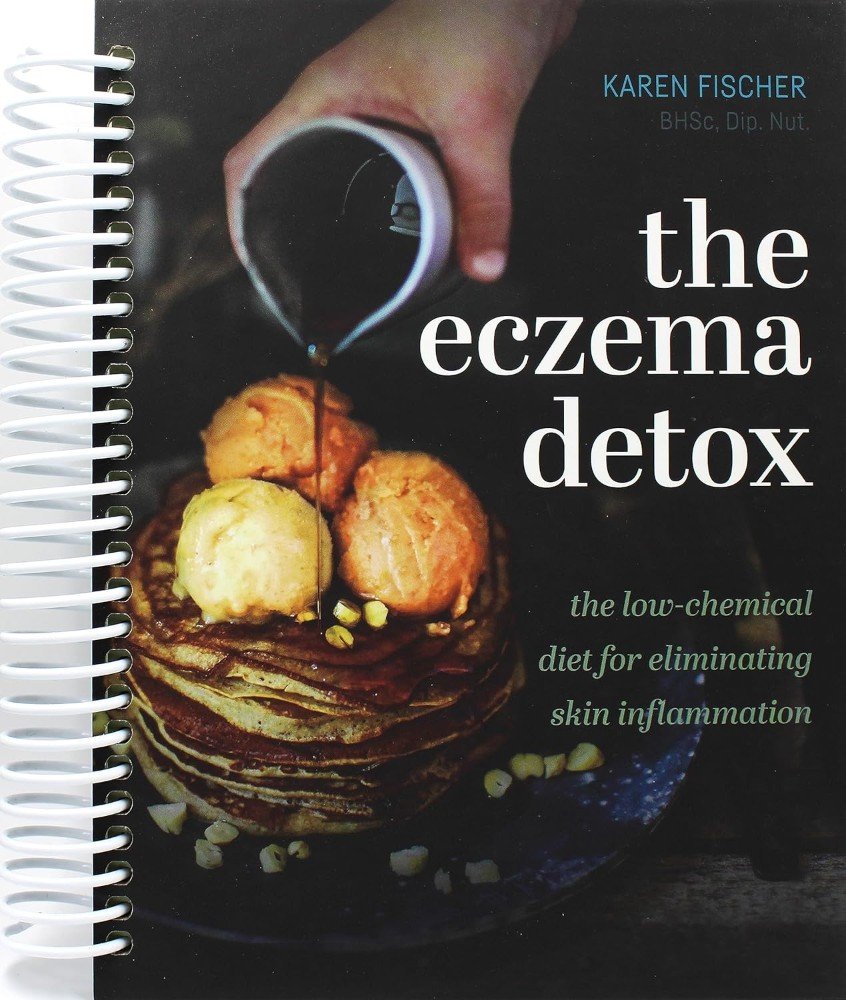Eczema Relief Through Diet
Eczema Relief Through Diet: What You Need to Know
Eczema, also known as atopic dermatitis, is a chronic skin condition that affects millions of people worldwide. It can cause red, itchy, and inflamed skin, making daily life uncomfortable and challenging. While many factors contribute to eczema flare-ups, diet plays a crucial role in managing symptoms. In this blog, we’ll explore:
- What eczema is and how it impacts daily life
- The role of diet in managing eczema
- Key insights from The Eczema Detox by Karen Fischer
- How the Eczema-Relieving Food Planner can help you find the right foods for relief

What Is Eczema?
Eczema is a common skin condition characterized by red, itchy, and inflamed patches of skin. It can affect people of all ages, though it is particularly common in children. The condition often comes and goes in cycles, with periods of clear skin followed by flare-ups.
There are several types of eczema, including:
- Atopic dermatitis: The most common type, often linked to allergies and asthma.
- Contact dermatitis: Triggered by contact with irritants or allergens.
- Dyshidrotic eczema: Causes small, itchy blisters, often on the hands and feet.
Eczema is not just a surface-level issue; it involves both genetic and environmental factors. Triggers such as stress, weather changes, allergens, and diet can worsen symptoms.

How Eczema Affects Daily Life
Living with eczema can be incredibly challenging. The constant itching, burning, and discomfort can interfere with daily activities, sleep, and mental well-being. Many people with eczema struggle with:
- Sleep disturbances: Intense itching at night can lead to poor sleep quality.
- Emotional toll: The visible nature of eczema can affect self-esteem and lead to anxiety or depression.
- Recurring flare-ups: Managing flare-ups requires constant attention to triggers, including environmental factors and diet.
Eczema isn’t just a skin condition—it’s a life condition. That’s why it’s so important to find effective strategies for managing symptoms.

The Role of Diet in Managing Eczema
Did you know that what you eat can significantly impact your eczema symptoms? While diet alone cannot cure eczema, it can help reduce inflammation and minimize triggers.
Certain foods contain compounds that may irritate sensitive skin, such as:
- Salicylates: Found in many fruits and vegetables.
- Amines: Present in aged or fermented foods.
- MSG (Glutamate): A flavor enhancer often found in processed foods.
- Sulphites: Used as preservatives in dried fruits and some beverages.
- Nitrates: Found in cured meats like bacon and sausage.
By identifying and avoiding these compounds, many people with eczema have reported fewer flare-ups and calmer skin. Conversely, incorporating anti-inflammatory foods like fresh vegetables, low-salicylate fruits, and healthy fats can support overall skin health.

Insights from The Eczema Detox by Karen Fischer
Karen Fischer, a renowned nutritionist, highlights the connection between diet and eczema in her book, The Eczema Detox. This comprehensive guide offers:
- A deep dive into the dietary triggers for eczema
- A step-by-step detox plan to eliminate problematic foods
- Recipes and meal suggestions tailored to eczema relief
Fischer’s recommendations focus on reducing foods high in salicylates, amines, and other compounds that may trigger eczema flare-ups. The book has helped many individuals take control of their eczema through simple, effective dietary changes.
How the Eczema-Relieving Food Planner Can Help
Managing an eczema-friendly diet can feel overwhelming, but the Eczema-Relieving Food Planner simplifies the process. This online tool is designed to help you:
- Filter foods by specific compounds: Identify foods low in salicylates, amines, MSG, sulphites, and nitrates.
- Browse by food category: Whether you’re looking for vegetables, fruits, or dairy, the planner helps you find suitable options.
- Search specific ingredients: Unsure if a food is safe? Use the search function to check compound levels.
- Mark favorites: Save your go-to foods and recipes for easy access.
For example, if you’re avoiding foods high in salicylates, simply select the Low Salicylates filter to view a list of suitable options. This personalized approach makes meal planning for eczema more manageable and effective.
Practical Tips for Managing Eczema
In addition to dietary changes, consider these tips to manage eczema more effectively:
- Stay hydrated: Drinking plenty of water supports skin hydration.
- Moisturize regularly: Use fragrance-free, hypoallergenic moisturizers to keep your skin barrier healthy.
- Identify triggers: Keep a journal to track flare-ups and identify potential triggers, whether environmental or dietary.
- Consult a professional: Work with a dermatologist or nutritionist to develop a personalized eczema management plan.
Take Control of Your Skin Health
Eczema may not have a cure, but with the right tools and strategies, it’s possible to manage symptoms and improve your quality of life. Diet plays a critical role in this journey, and resources like The Eczema Detox and the Eczema-Relieving Food Planner provide valuable guidance.
Are you ready to take the next step? Visit our Eczema-Relieving Food Planner today to start exploring foods that can support your eczema relief journey.
🌱 Eczema-Relieving Food Planner
📖 Learn more about The Eczema Detox: The Eczema Detox by Karen Fischer
Share Your Story
Have you tried dietary changes for eczema relief? Share your experiences in the comments below! Let’s build a community of support and encouragement for those navigating this challenging condition.
Leave a Comment